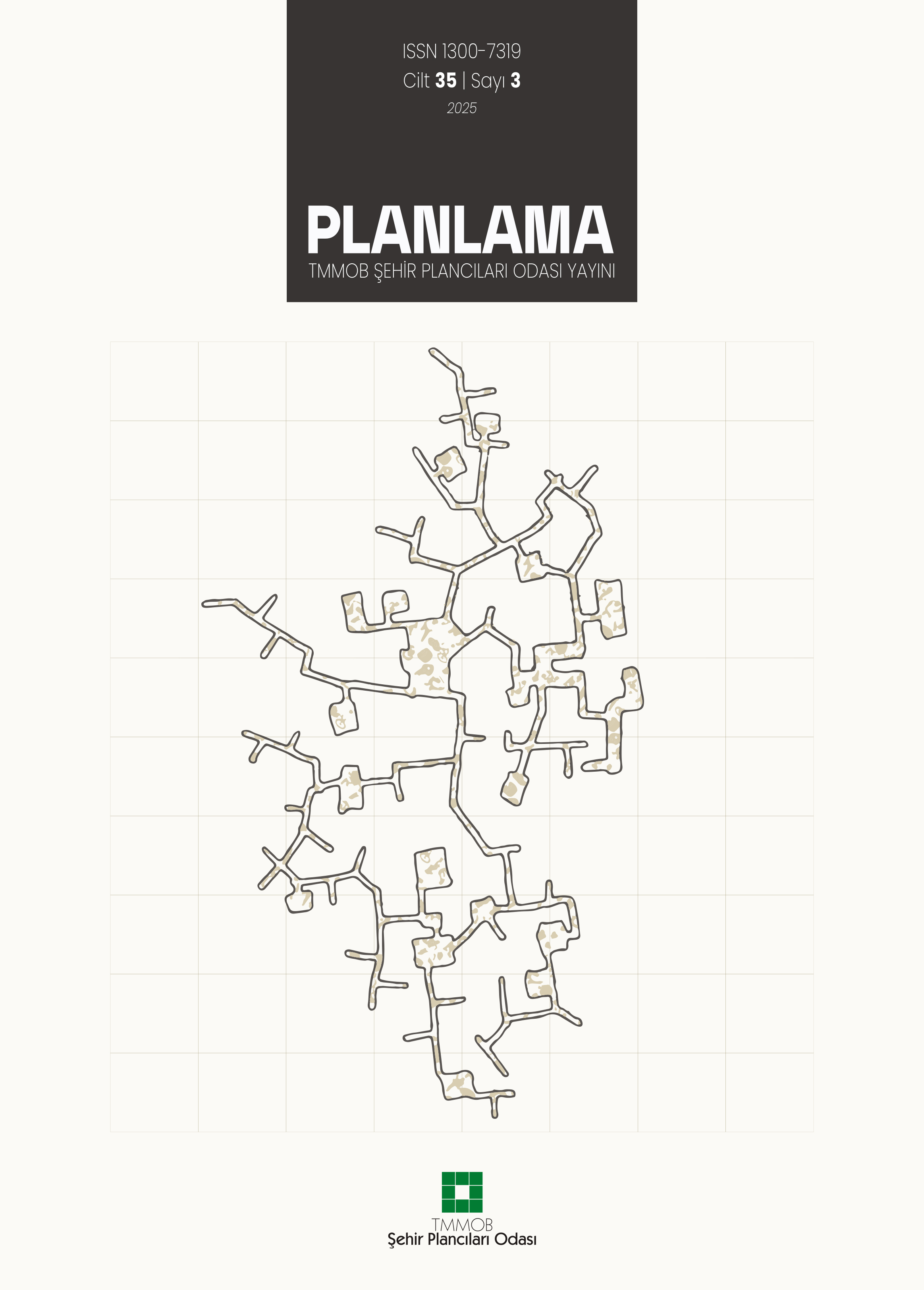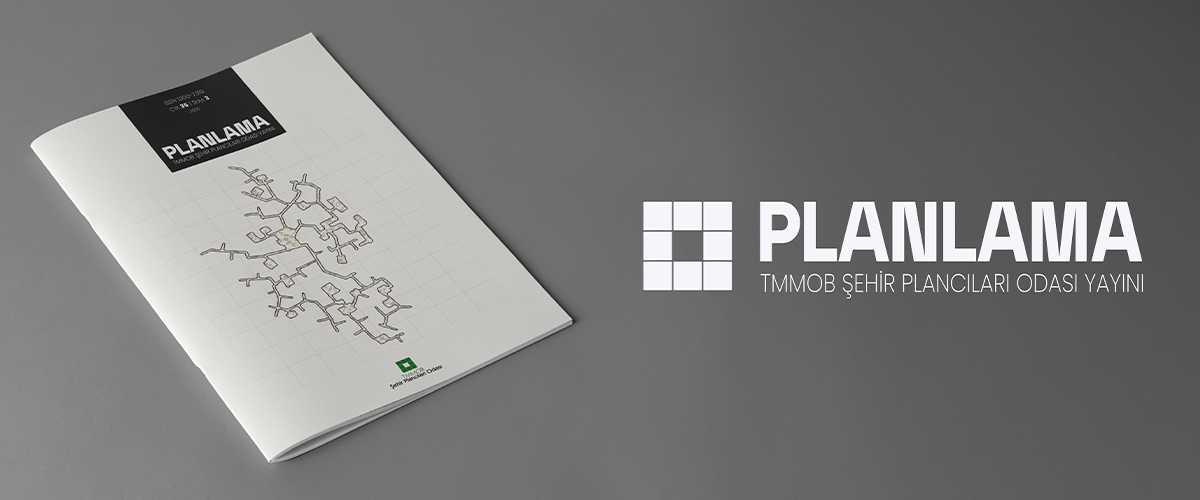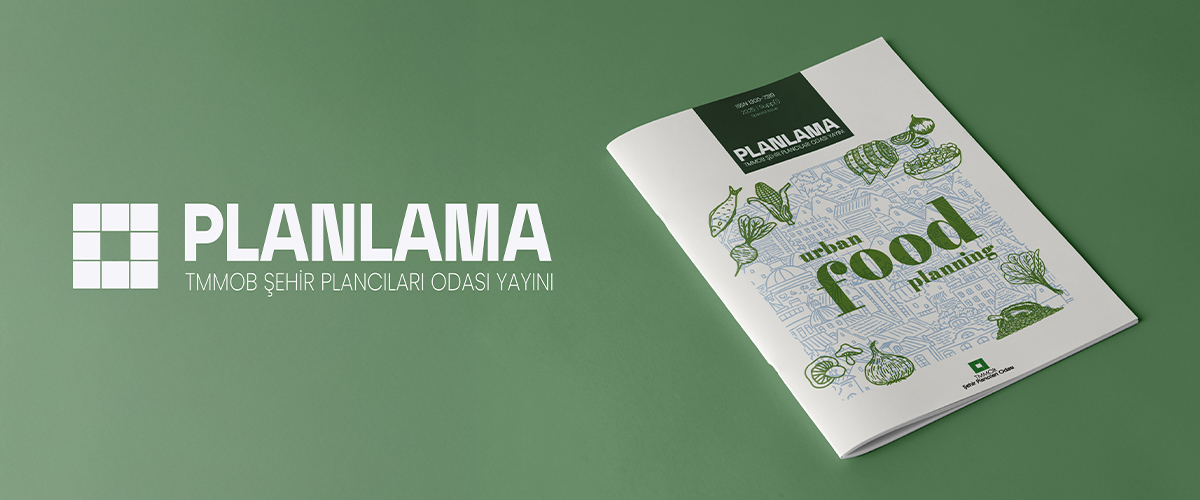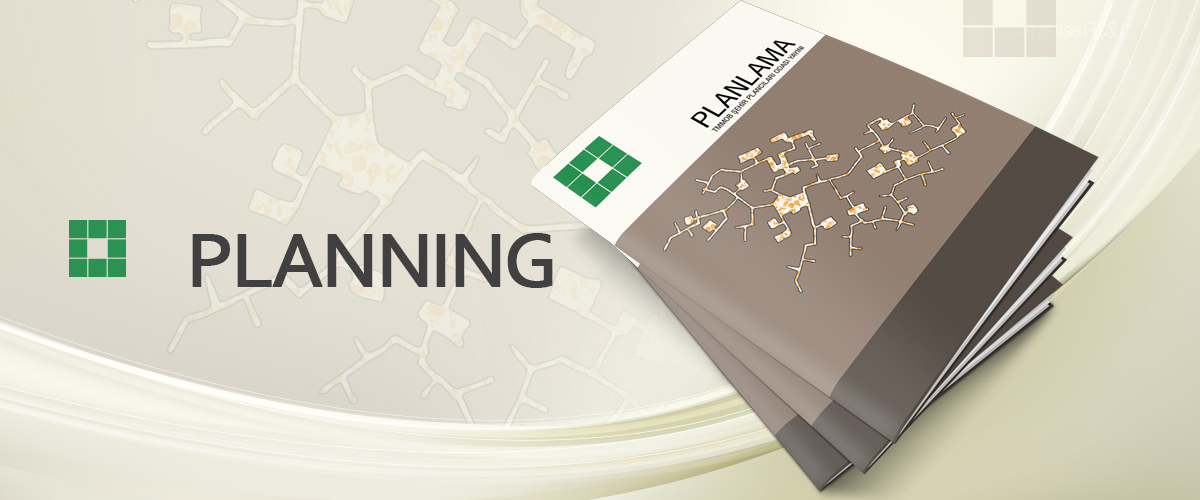INFORMATION TO AUTHORS
INFORMATION TO AUTHORS
Authors should carefully follow these instructions to upload articles into the system, to undergo blind peer review, and to prevent delays in the publication process.
-
A. GENERAL INFORMATIONS
In the Journal of Planning, the official publication of the UCTEA Chamber of City Planners of Turkey, original research articles, review articles, opinions, book reviews, and current discussions and evaluations related to the profession are published from various fields such as urban and regional planning, regional development, rural area planning, environment and ecology, urban design, urban conservation, urban renewal and transformation, urban sociology, urban economics, local administrations, urban transport planning, landscape planning, disaster management, and migration. The Journal, providing open and free access, aims to disseminate academic research and local implementation examples from the fields of urban and regional planning and related areas, as well as urban and regional policies and planning tools to colleagues and readers.
In the Journal of Planning, published online three volumes per year, each article undergoes a scientific and impartial evaluation process. Following the pre-examination by the Journal Secretariat and the pre-evaluation by the Editorial Board, the Editors invite experts in their fields for peer review. The Editors have the final decision-making authority for all articles. Articles accepted for publication in the Journal are published in the order of acceptance dates. Only one article of the same author(s) is included in an issue, even if they coincide in the order.
The Editorial Board of the Journal and Kare Publishing have shaped their publication policies and editorial processes according to the rules of the Council of Science Editors (CSE), the Committee on Publication Ethics (COPE), and the European Association of Science Editors (EASE).
-
B. SUBMISSION OF ARTICLES
Before submitting the article, the corresponding author should ensure that all authors of the article obtain an Open Researcher and Contributor ID (ORCID) number. To obtain an ORCID number, please visit https://orcid.org
In studies requiring ethics committee decision, an ethics committee approval must be obtained. This should be indicated in the methodology section of the article in a manner that does not reveal the identity of the author(s). Ethics committee approval document or relevant legal documentation should be uploaded to the system as a separate file.
The Journal of Planning features articles in both Turkish and English languages. Article length varies as follows: 9000 words for research articles (including full text, tables, figures, footnotes, etc.; excluding title, abstract, keywords, and references); 5000 words for review articles; and 2500 words for opinion letters, book reviews, and other contributions. All submissions undergo initial evaluation by the Journal Secretariat, Editors and Editorial Board; thereafter, they are sent for review by referees. All submissions are subjected to anonymous evaluation and revision, with author identities concealed. Author(s) may be requested to address inquiries regarding the paper or to rectify any deficiencies as needed. The articles chosen for publication in the Journal undergo a preparation process during which all information is meticulously reviewed for accuracy. At this stage, the manuscript thoroughly examined and finalized before being submitted to the author(s) for their last control and approval.
Submitting an article to the Journal implies that the work has not been published previously and that its publication in the Journal of Planning is approved by the author(s). Author(s), upon acceptance of publication, transfer(s) all rights pertaining to the article to the UCTEA Chamber of City Planners of Turkey; and also agree(s) not to publish the work in another language or else where without permission.* If the submitted manuscript has been previously presented at any conference, the conference name, date, and location where the conference was held should be indicated, and for articles derived from postgraduate thesis studies, the thesis title and the institution where it was prepared should be noted as a footnote on the first page during the online submission process and informed to the Editor(s) as a note. However, this information should not be included in the text file to avoid revealing the author(s)’ identities.
Author(s) are responsible for obtaining permission to reproduce copyrighted material from other sources and must sign an agreement transferring copyright to the publisher. An author must obtain permission before using any figure, table, or text from another source. This applies to “derivative reproductions” as well, such as creating a new figure or table derived from a copyrighted source.
* Copyright transfer procedures are carried out by the publisher via email during the preparation stage of the article for publication, after the article has been approved by the Editorial Board and reviewers.
-
C. ARTICLE CATEGORIES
Research Article: The articles which represent original and distinctive research endeavors that arrive at conclusions through scientific reviews, observations, and research within the designated fields outlined in the article categories section. Articles written in English should consist of an English title, abstract, and keywords, as well as a Turkish title, abstract, and keywords, along with sections for introduction, theoretical framework, methodology, findings, discussion, conclusion, and references. The text, including tables, figures, footnotes, etc. –excluding the title, abstract, keywords, and references– should not exceed 9000 words. Both the English and Turkish abstracts should consist of a maximum of 250 words each.
Review Article: The original articles which are comprehensive literature reviews conducted by experienced authors who have intensive work on a specific subject or current developments within the designated fields outlined in the article categories section. These articles synthesize existing knowledge and conceptual formations based on a thorough literature review, providing a critical evaluation highlighting their strengths and weaknesses, addressing controversial or missing points in the literature, and identifying areas requiring further research. The titles and abstracts of these articles should be written in the format of research articles; the subsequent sections should consist of introduction, text, and references and should not exceed 5000 words.
Opinion: The original articles which evaluate current and important topics and/or the author(s)’ own opinions and findings from their research within the designated fields outlined in the article categories section. These opinions should be written in the format of research articles, the subsequent sections should consist of introduction, text, and references and should not exceed 2500 words.
Book Review:The original articles which include comprehensive evaluation and discussion of books published in the scope of the Journal of Planning. These reviews should be written in the format of research articles, the subsequent sections should consist of introduction, text, and references and should not exceed 2500 words.
The essays other than those mentioned above (translations, competition presentations, research abstracts, Chamber’s opinions, short evaluations, and discussions) are published after passing through the filter of the Editors and/or the Editorial Board.
-
D. PREPARATION OF ARTICLES
Article submissions to the Journal of Planning are accepted online. Article submission can be made by using the “Submit Article” tab on the website (www.planlamadergisi.org).
The submission should include a cover letter, application page, main text and references, tables and figures (if any), acknowledgment letter (if any), and ethics committee approval document (if required). The following documents should be uploaded to the online submission system:
-
Cover Letter
-
Submission Page
-
Main Text and References
-
Tables and Figures (if any - they will be uploaded as separate files)
-
Acknowledgment Letter (if any)
-
Ethics Committee Approval Document (if required)
-
Copyright Transfer Form
-
Proofreading Certificate or Statement
All sections of the article should be prepared in 11-point “Arial” font size and double-spaced; leaving a margin of 2.5 cm (1 inch) on all sides of the page. The main text along with tables and figures should be uploaded as separate files into the system. The main text should be in Word format, and line numbers should not be included within the text. Article pages should be sequentially numbered throughout the article.
-
Cover Letter
The cover letter should be uploaded as a separate document to the system. It should clearly state that the manuscript has been read and approved by all authors, that it represents an original work, and that it has not been published or is under consideration for publication elsewhere. In addition, the manuscript title; authors’ names, surnames, and affiliations; name and city of the institution where the study was conducted; full names of any supporting funding agencies or organizations, if applicable; and details regarding ethics approval, including the name of the ethics committee, date, and approval number, if the study required ethics approval, should be included on this page. The contact information of the corresponding author, including his/her full name, address, telephone number, mobile phone number, and email address, should also be provided in this letter.
-
Submission Page
The main text, references, tables, and figures (graphs and photographs should be included under the heading “figures”) should not contain the author(s)’s name(s) and surname(s) or the initials of the name(s) and surname(s) of the author(s) and the name or abbreviation of the institution where the author(s) work in the content or in the file name. If the article is derived from a thesis, the name or abbreviation of the relevant study should not be included; if the article has been previously presented at a scientific event, the name or abbreviation of that event should not be included. This information should be uploaded as a separate document to the system.
-
Main Text and References
Main Text Document: The arrangement should be made according to the pages, including the full text and references. The article title, author(s)’ name(s) and surname(s), abstract, and keywords will be requested in the online article submission system and should not be uploaded as a separate document into the system.
Citations and References: Sources in the articles should be written according to the latest APA style. Footnotes should not be used for referencing. In-text references should be made by opening parentheses at the appropriate place in the text, stating the author’s surname, publication year, and page number. All sources used should be listed in the reference list in alphabetical order by authors’ surnames and in chronological order for each author. Care should be taken to adhere to the writing rules differentiated by the APA style according to the type of work. More details and examples of APA style and grammar guidelines can be viewed at https://apastyle.apa.org/style-grammar-guidelines.
-
Tables and Figures (if any - they will be uploaded as separate files)
All tables should be uploaded as a Word document (.doc, .docx) and figures should be uploaded as separate documents in .jpg or .png format. Figures may include graphs, charts, maps, drawings, and photographs. In the separate documents to be uploaded, the numbers, titles, and sources of the tables and figures should be specified; this information should be placed above the tables and below the figures. The locations of the tables and figures within the main text should be indicated in a separate paragraph within the text (e.g., using the phrase “Figure 1 will be placed here”). (Important Note: The positions of tables and figures may change during typesetting, so the specified locations are not absolute and will be placed in the most appropriate locations by the layout team.)
-
Acknowledgement Letter (if present)
The acknowledgment letter should be uploaded as a separate document in the system..
-
Ethics Committee Approval Document (if required)
In studies requiring ethics committee decision, an ethics committee approval must be obtained, and the ethics committee approval document should be uploaded to the system as separate file.
-
Copyright Transfer Form
The author(s) declare that the submitted manuscript is original, has not been published elsewhere, and is not simultaneously under consideration by another journal. If the manuscript is accepted for publication by the Journal of Planning, the author(s) agree to transfer the copyright to the Journal. All authors must sign to confirm that they have seen and approved the final version of the manuscript and that they are jointly responsible for its content. The Copyright Transfer Form, available on the journal’s website, must be completed and signed by all authors and uploaded to the online submission system.
-
Proofreading Certificate or Statement
To improve the linguistic clarity and academic quality of manuscripts that are written entirely in English but whose authors are not native speakers, a proofreading certificate issued by a native English speaker or a professional language editing service, or a clear and convincing author statement explaining how and by whom the proofreading was carried out, must be submitted. This document or statement must be uploaded to the system within one month following the acceptance of the manuscript for publication, after the peer review process has been completed. Please note that proofreading performed solely by AI-based tools does not fulfil this requirement, as such tools cannot replace the expertise and scientific judgement of a qualified human reviewer.
-
E. COPYRIGHT, ORIGINALITY, AND ETHICS
Copyright Notice:The copyright of all published materials is transferred to the Journal by the author(s). Without prior written permission from the publisher, no part of the publication may be used. All rights to the articles belong to the Journal after publication.
Open Access and Creative Commons Attribution:
-
Open Access: The Journal of Planning is an open-access journal, which means that readers can access all content free of charge. Readers can read, download, copy –providing citation, distribute, or use the full texts of the articles for other legal purposes without the permission of the publisher or author(s). This is in line with the Budapest Open Access Initiative’s (BOAI) definition of open access.
-
Creative Commons Attribution: Creative Commons Attribution - Non Commercial 4.0 (CC BY - NC 4.0) allows the distribution or copying of articles for non-commercial purposes, their use within a collaborative work, provided that the article is not modified and proper attribution is given.
Originality: Articles are checked by the publisher using the iThenticate program for unethical situations and plagiarism detection purposes. In cases where the similarity rate exceeds 20% in total, the article is exclusively reviewed for plagiarism. This review is also conducted in cases where there is a high density of citations based on the same source. Editors may also refer to peer review if deemed necessary in the plagiarism review process. The decision to reject the application due to plagiarism or to include it in the normal peer review process is at the discretion of the Editors.
Ethics: Obtaining written permission from the authors and publishers of any previously published material (text, tables, figures, etc.) is the responsibility of the author.
The Editorial Board will adhere to the principles outlined in the Committee on Publication Ethics (COPE) guidelines regarding allegations and/or suspicions of plagiarism, citation manipulation, and data fabrication concerning submissions to the Journal.
-
F. EVALUATION AND PUBLICATION PROCESS
Evaluation: All manuscripts are initially examined by the Journal Secretariat for compliance with formatting and writing guidelines, as well as for similarity (plagiarism) rates. Authors are informed of any necessary corrections and asked to resubmit their manuscripts accordingly. Subsequently, the manuscripts are forwarded to the Editorial Board and subjected to blind evaluation based on predetermined criteria. Following this pre-evaluation process, which usually takes about one month, manuscripts deemed suitable for peer review are sent to the reviewers, while those deemed unsuitable are rejected directly, with written justification provided to the authors. Any revisions requested at any stage of the process will be communicated to the authors by the Editors. For manuscripts deemed suitable for publication after peer review, the final decision process is initiated by the Editors and finalised by the Editorial Board. For manuscripts written entirely in English, if the authors are not native English speakers, the manuscript must undergo language proofreading before publication. A document certifying this process must be uploaded to the online submission system within 1 month of acceptance.
Timeframes: In the peer review process, reviewers are given 30 days for an initial evaluation and 10 days for a second-round of review. However, these periods may be extended at the discretion of the Editor, depending on the scope and content of the manuscript. Once a manuscript has been reviewed by the reviewers and returned to the author(s) for suggested revisions, a period of 1 month is allowed for minor revisions, 2 months for major revisions, and 3 months for complete rewrites. If there is no response from the author(s) within these time limits, despite their acceptance of the revisions, the manuscript will be returned without further notice and will not be considered for reevaluation.
Responsibility for the Article: The author(s) assume(s) full responsibility for the information contained in the published articles. The Journal does not assume responsibility for these.
Publishing Rights: The entire or partial content of an article published in the Journal, including any accompanying tables or figures, cannot be publihed in another journal without the knowledge and written permission of the Journal Editors and the Editorial Board.
Required Information: Journal Editors or the Editorial Board may request from the authors the data on which the article is based for examination during the preliminary evaluation process. Therefore, it is important for the address and other contact information facilitating easy access to the authors to be included on the title page.
Fees: There are no charges for article submission, processing, and publication.

















